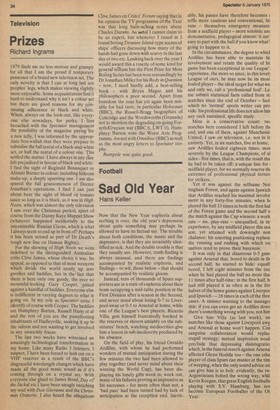Television
Prizes
Richard lngrams
1979 finds me no less morose and grumpy for all that I am the proud if temporary possessor of a brand new television set. The only novelty is that I can at long last see peoples' legs, which makes viewing slightly more enjoyable. Some acquaintances find it hard to understand why it isn't a colour set but there are good reasons for my ccintinuing adherence to black and white. When, always on the look-out, like everyone else nowadays, for perks, I --first broached with the Spectator management the possibility of the magazine paying -for a new telly, I was informed by the appropriate box-wallah that they were prepare to subsidise the full rental of a black-and-white set, or half the rental of a colour one. This settled the matter. I have always in any ease felt prejudiced in favour of black and white. I find the sight of Reginald Bosanquet or Alistair Burnet in colour, including hideous make-up, a deeply upsetting one. I am also spared the full gruesomeness of Doctor Jonathan's operations. I find I can just about bear the sight of blood or tomato sauce so long as it is black, as it was in High Noon, which was almost the only television I saw over the Christmas period, apart of course from the Danny Kaye Muppet Show (whatever happened incidentally to the interminable Russian Circus, which is what I always seem to end up in front of? Perhaps it has been vetoed as part of Dr Death's tough new line on Human Rights).
For the showing of High Noon we were indebted to the distinguished Australian critic Clive James, whose choice it was. Its appeal, as opposed to that of most westerns which divide the world neatly, up into goodies and baddies, lies in the fact that there is here only one goody, the ever so mournful-looking Gary Cooper, pitted against a handful of baddies. Everyone else is indifferent in varying degrees to what is going on. In my role as Spectator critic I identify of course with Cooper. The baddies are Humphrey Burton, Russell Harty et al and the rest of you are the pussyfooting inhabitants of Hadleyville, soaking it up in the saloon and not wanting to get involved in any unseemly fracas.
The last two weeks have witnessed an amazingly technological transformation in my home. Like many Radio 3 listeners, I suspect, I have been forced to lash out on a VHF receiver as a result of the BBC's disgraceful wavelength changes which have made all the good music sound as if it's coming through on a crystal set. With everyone else glued to James Bond, Day of the Jackal etc I have been smugly enriching my soul with Don Giovanni and the Christmas Oratorio. I also heard the ubiquitous Clive James on Critics' Forum saying that in his opinion the TV programme of the Year was that long balls-achingseries about Charles Darwin. As ustial I cannot claim to be an expert, but whenever I tuned in I found boring Treasure Island-type scenes of ships' officers discussing how many of the hands had gone down with scurvy in the last day or two etc. Looking back over the year I would award this a rosette of some kind for genera! taium but the First Prize for Most Boiing Series has been won resoundingly by Dr Jonathan Miller for his Body in Question — now, I need hardly add, a best-selling book — with Bryan Magee and his philosophers a poor second. Apart from boredom the year has yet again been notable for bad taste, in particular Holocaust (BBC), the Russell-Bragg biographies of Coleridge and the Wordsworths (Granada) not to mention the degrading on-going Forsyth/Gray-son war (BBC 6, LWT 0). Humphrey Burton wins the Worst Arts Programme Award with Omnibus (BBC) as well as the most angry letters to Spectator trophy.
Rumpole was quite good.






























 Previous page
Previous page